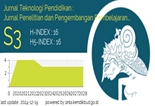Development Study of Technology-Based Adaptive Learning Modules for Students with Special Needs
Abstract
Keywords
Full Text:
PDFReferences
Astuti, W., Friansyah, D., & Salman, E. (2021). Development of Adaptive Learning Modules for Children with Special Needs in Sekolah Luar Biasa Negeri Lubuklinggau City. Silampari Journal Sport, 1(2), 77-99.
Birriy, A. F., Indahwati, N., & Nurhasan, N. (2020). Development of adaptive physical education learning tools for bocce games based on pbl for Down syndrome to teach motor skills and social interaction. JOSSAE (Journal of Sport Science and Education), 5(2), 94-103.
Borg, J., Lindström, A., & Larsson, S. (2011). Assistive Echnology in Developing Countries: A Review from The Perspective of The Convention on The Rights of Persons with Disabilities. Prosthetics and Orthotics International, 35(1), 20–29. https://doi.org/10.1177/0309364610389351
Hanjarwati, A., & Aminah, S. (2014). Evaluation of the Implementation of the Yogyakarta City Government's Policy on Inclusive Education. INKLUSI, 1(2), 221–248. https://doi.org/10.14421/IJDS.010206
Jalil, A., Tohara, T., Shuhidan, S. M., Diana, F., Bahry, S., & Norazmi Bin Nordin, M. (2021). Exploring Digital Literacy Strategies for Students with Special Education Needs in the Digital Age. Turkish Journal of Computer and Mathematics Education, 12(9), 3345-3358.
Kurniawan, R., Heynoek, F. P., & Wijaya, M. A. I. (2022). Development of teacher modules on learning basic locomotor material for class II SDLB autism. Patriot Journal, 4(3), 190-206.
Kusumawati, O., & Nugroho, A. W. (2019). Development of a learning module for PE through exploring nature around school (AJASS) activities for deaf children at the Extraordinary Primary School (SDLB) level in Bandar Lampung City. APPLIED: Journal of Basic Education and Learning, 6(2), 165-172.
Lancioni, G., Sigafoos, J., O'Reilly, M., & Singh, N. (2012). Assistive Technology: Interventions for Individuals with Profound and Multiple Disabilities. Springer Science & Business Media.
Mubarok, N.'. (2022). Fulfillment of Children's Rights in Malay Countries. AL-HUKAMA': The Indonesian Journal of Islamic Family Law, 12(2), 21–46. https://doi.org/10.15642/ALHUKAMA.2022.12.2.21-46
Mulyani, T. (2020). Distance learning strategies for students with special needs in inclusive elementary schools in the covid-19 pandemic era. Elementary: Islamic Teacher Journal, 8(2), 247-276.
Putro, E., Simanjuntak, T., & Hergianasari, P. (2023). MULTI STAKEHOLDER PARTNERSHIP IN SURABAYA-LIVERPOOL SISTER CITY COOPERATION ON SUSTAINABLE INCLUSIVE EDUCATION IN 2022. Journal of Neo Societal, 8(2), 109-120.
Rafikayati, A. (2022). Training on Adaptive Learning Services for Children with Special Needs in Inclusive Education Settings. Kanigara, 2(1), 66-71.
Ratih, R. D., Damastuti, E., & Ananda, P. A. (2021). Identification of children with special needs in inclusive schools. Journal ICSAR ISSN, 5(2), 15-20.
Sutarya, M. (2019). Inclusive Education in Higher Education: A Study of the Center for the Study and Service of Students with Special Needs at Politeknik Negeri Jakarta. Institut PTIQ.
Syam, T. A. R. (2018). Development of a Circuit Learning Model to Assist Locomotor, Non-Locomotor, and Manipulative Movement Patterns of Down Syndrome Children. Sports Window, 3(2).
DOI: https://doi.org/10.33394/jtp.v9i3.12250
Refbacks
- There are currently no refbacks.
Copyright (c) 2024 Umi Masruroh, et.al

This work is licensed under a Creative Commons Attribution-ShareAlike 4.0 International License.
This Journal has been Indexed by:
Jurnal Teknologi Pendidikan
ISSN: 2656-1417 (Online)
ISSN: 2503-0620 (Print)
Published by Program Studi Teknologi Pendidikan, FIPP
Universitas Pendidikan Mandalika
Email: [email protected]

This work is licensed under a Creative Commons Attribution-ShareAlike 4.0 International License.















.png)





